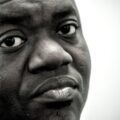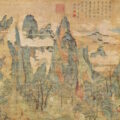Six Proposals for the Reform of Literature in the Age of Climate Change

A century ago, China was in chaos. The Qing Empire had been overthrown by a loosely coordinated confederation of elites. The regional militias and armies that held sway were each too weak to ensure safety but too evenly matched to forge unity. Foreign powers exploited the Chinese economy at will.
Intellectuals at the time became convinced that the root of the crisis was Chinese culture itself. In 1916, a student named Hu Shi inaugurated the literature of this belief with a treatise: “Basic Proposals for the Reform of Literature.” With this, Hu attempted to push literature into a new era by insisting that it stop doing what it had long done. He argued that literature should no longer imitate ancient writings, that it should quit relying on elaborate allusions, and that it must forego classical elaboration in favor of the speech patterns of common people.
Hu Shi’s essay would become a core document in the creation of what we now call Modern Standard Chinese (or Mandarin), and served as an impetus for the immense cultural and political revolutions of the twentieth century in China.
Today, global cosmopolitan culture faces a similar chaos. Power is concentrated in the hands of a few independent corporations and states, each strong enough to escape environmental regulation, none with the will or mission to provoke change in themselves or others. Day after day, human activity fills the atmosphere with carbon, transforming Earth’s climate, melting the polar ice caps, already destroying the homes and habitats of the planet’s many creatures—including ourselves. Yet we lack the ability to visualize these problems, to locate their source in our own actions and lives, to tell and transform the stories of the interactions between our behavior and our biome.
This is not a failing of science, the science is quite clear: it is a failing of culture. The single most influential artwork of climate change remains Al Gore standing in front of a Powerpoint presentation ten years ago. Global culture has not just failed to adapt to the challenges we now face: it actively prevents us from facing those challenges.
To change this, we need to break with our existing traditions of art and media, even if that means rejecting some of the works we love most. After Hu Shi raised the possibility that Chinese writers should abandon the regulated verse written by China’s greatest poets, he took a moment to sympathize with his audience: “I know that when you hear this there will be some among you who simply cannot bear it.” He proposed eight reforms for the literature of his future; as a person of smaller ability and stature, I have just six.
1. Reject Progress Narratives
Narratives of progress lie at the heart of present-day human excess. In science, politics, and art, humans project an endlessly mounting series of conquests—the “creative destruction” of global capitalism, modern amnesia overriding old knowledge, scientific innovations making old models obsolete, and Pound’s notorious “Make it new” driving the avant garde.
With these narratives holding sway, we are unable to imagine stories of forgetting, stories of healing, stories of repudiation. When we imagine the survival of our ecosystem—or even the survival of pieces of our ecosystem—as progress, when we add it to the desires of the progressive political actor, when we think of a “better environment,” we commit to the logic of increase and intensity that has driven mass consumption and climate change.
Progressive logic refuses to account for the inevitability of declining access to water, air, and arable land. It transforms the struggle to dismantle a destructive system into an episode of Scooby Doo or a volume of the Hardy Boys, in which the broken waste pipe is discovered dripping green goo and the story ends with its owner in handcuffs. These narratives end before the real conversation should start: the one that prevents such crimes in the first place, and strikes at the motivations that cause them.
Progress is also a method by which fiction makes itself attractive to readers. Think of Joyce’s epiphanies in Dubliners. In “After the Race,” a young man gambles all night and we are led to realize, when dawn strikes, the immense wastefulness and futility of what he’s done. The form of the story’s conclusion replaces an emphasis on waste with an emphasis on gain: the human lives that Joyce describes are horribly wasteful, but what the reader receives is a form of intellectual profit.
The story’s enlightenment of the reader ennobles the character’s waste; in the same way, a nation’s economic success justifies the increasingly miserable conditions of its people, animals, and plants.
2. Retire the portrait of the single soul
Most stories specifically identify individuals who profit from narratives of progress, whether intellectually or materially. In Joyce’s epiphany model, the reader sees some moral profit. In the standard adventure story, it’s both the reader, who is entertained, and the hero—Phileas Fogg makes it around the world in eighty days, Katniss has a family with Peeta, James Bond gets the bad guys. The triumphal feeling of these stories comes from their selective attention to just a tiny part of the network of relationships that enfolds their characters.
In the stories we need, though, nobody exists outside of some reference to social and physical contexts. Life touches at life from all points on the globe at all times.
Individualism is an intervention we make into our environment. It is a destructive and atomizing act of imagination. It erases our radical dependence on each other and on the environment. We know the intellectual and moral thinness of this trope (just try to watch the 1992 “iconoclastic-cowboy-in-the-rainforest” film Medicine Man) yet we remain endlessly fascinated by its variations in media, from the popular to the avant-garde.
This is the original sin handed down from Thoreau’s Walden: pretending no one else exists, unmaking the blacksmith that sold Thoreau $3.90 worth of nails, the man who carried his luggage to his pond-side cabin, and Ralph Waldo Emerson, who housed and fed Thoreau while he edited the manuscript. Readers experience a book as one person speaking to another, almost epistolary, missing the way in which a book is a collaboration of many hands. Romantic ideas of the artist slaving away at a desk alone in the middle of the night prevent us from seeing the way in which all artwork is the product of many minds thinking together.
Reducing literature to a procession of isolated actors (or authors) belies the responsibility readers have to see the disastrous paradigm in which a focus on individuals occludes acts that harm the broader community.
3. Stop yelling over the biomes
The forest is not your canvas. The blue sky does not symbolize possibility. The lone gull scrabbling in alley dirt far from the ocean is not your emblem. The extent to which metaphors have colonized nature is the extent to which we fail to see the leaf blight, the greenhouse, and the unused concentration of food calories in the dumpsters of our cities. It will be impossible to seriously consider systems of living beings when we force them to conform to anthropomorphic narratives and tropes.
Our self-regard produces our ignorance. Even the environmentalist movement has been forced to mobilize sentimental ideas about the natural world in order to mobilize people. We select parts of an ecosystem for anthropomorphization so that we can save them. In Jonathan Franzen’s Freedom, for instance, a bird sanctuary becomes an object of moral choice, less a textured interaction with real living beings than a metaphor for a character’s goodness and generosity. Environmental protection becomes an indulgence that can be purchased to expiate the individual’s ongoing sins. Franzen is being a realist: human beings treat animals like mirrors to the extent that love for the natural world becomes indistinguishable from narcissism, and then we are surprised that our ecotourism, dolphin swims, and 5K runs are miserably incapable of encouraging biodiversity.
This habit has its darkest dimension in the world of children’s media. Animals today are maximally commodified, absolutely lacking in the will to survive, reconfigured to serve the human person in everything from psychological comfort to sexual fantasy. If you want to teach a child that an animal is a kind of crippled person, give them Black Beauty. If you want to make them believe that an animal is a slave, show them Lassie.
The culture is filled with welcoming, deluded fantasy versions of the natural world.
4. The poor cannot always be with us
In the last twenty years, advanced economies have taken pride in their modest decreases in emissions per capita, completely ignoring the way in which this is possible because of the exportation of manufacturing to the global South. Vast disparities in income, as well as vast differences in the intensity of social and political systems from region to region, drive climate destruction in the present day and fundamentally restrict our ability to conceptualize the global ecosystem of tomorrow.
These types of inequities are almost always accompanied by moralizing fictions. The industrialized North looks with nostalgia and admiration at the false image of the people whose labor and resources fund its comfort, imagining them to be somehow closer to nature. This is only true if one defines “nature” as the thing that industrialization destroys; something else for the global North to use as raw material. In cultural structures that value some people over others, the excluded groups are denied both the rewards of community participation and all incentives to care for the larger system. There’s little choice but to attempt to play “catch-up” through industrial policies and resource exploitation—processes that the global climate can no longer sustain.
Full partnership for everyone in a global ecosystem means redistributing the rewards that the developed world has already incurred by harming it.
The romanticization of the materially poor as environmentally ethical appears most often in travel writing, but is visible in work from Dances with Wolves to the distinction drawn between the Emishi villagers and the citizens of Irontown in Princess Mononoke. In communities without access to capital, people do consume less and pollute less, but their poverty is nonconsensual, unsustainable, and immoral. It leaves them no recourse but to strive for the same economy of mass consumption modeled by the global North.
Understanding what it means for a community to be materially poor and food insecure should shape our reading. This does not mean reminiscences of stately childhood poverty survived, or tragic Dickensian accounts of the benighted and voiceless, but the contemporary art and speech of the global underclass: the voices of the poor telling us not what we want to hear, but what is actually happening. They are saying what everyone else needs to hear: that nothing blights the land like the starvation of its people.
5. Choose systems over objects
From the humblest grammatical formulation all the way up to the way we conceptualize our most cherished ideals, the English language is choked by metaphors of possession and exchange, and sorely lacks metaphors of membership and interrelation.
When Robinson Crusoe finds himself alone, his mind dwells overwhelmingly on the things he can obtain and construct. He makes inventory after inventory, moving quite naturally between objects and animals and even, in the case of Friday, people. We can feel, reading the book in the present day, that one of the issues he is working through is his relationship with his father, who encouraged him to pursue a stable apprenticeship rather than going to sea; the accumulation of shipwreck nails and goats stands in for the accumulation of capital that would have been possible in sedate Britain. But Crusoe has no way to talk literally about his father, or the tenuousness of their connection. Without his fixation on objects of value, he would entirely lack the kind of language that one might use to describe his love and distance. We see the descendants of this muteness in every diamond advertisement; it is especially clear in Station Eleven, where the inert and unusable objects of a pre-apocalyptic society anchor, physically, the virtues of the post-apocalypse, collected in a museum that serves as a kind of cradle of civilizational continuity.
We too often connect by giving and taking; we see environments only as a motion between the absence of objects (nature) to the presence of objects (wealth); we miss the true identity of our situation as a web of interactions that are already in a relationship to us, and whose future depends on the thoughtfulness of those interactions. The cradle of future human society will, of course, be a place with sweet water and abundant food, but more importantly it will be a place that human presence improves rather than depletes. Understanding a phenomenon, feeling something about it, depends on our understanding of the cooperations between the many smaller things that make it up together. This cannot be represented via individual objects.
You may worry that the amelioration of this deficit in fiction will end in terrible, dry Marxist novels—we love a hero story, a relationship figured as something the protagonist “obtains” through great deeds—but the change is already starting. The most popular of popular fiction today builds worlds, dense networks of interconnection whose logics and complexities are more layered and more powerful than any individual character could ever be.
It is becoming increasingly easy to pass over Knausgård’s My Struggle out of mistrust in its apparent self-interest and individualist closure. Meanwhile, readers increasingly spend their time poring over the details of fantasy worlds, delighted to learn how characters on distant planets feed themselves, communicate without voices, engage in rituals of self-sufficiency and health. And then, in what is perhaps the greatest hope for fiction today, people participate in fiction. They write a fanfic or attend a book club or play Quiddich on the campus green. They dream themselves into capacious and novel systems. This gives them the power and vision to build futures.
6. Literature can no longer hang outside the world
A typical quality of modern thinking is careful attention to questions of what we can know and how we can know it—ontology and epistemology, two pursuits native to research and theory. Partway through the century, theorists brought those questions to bear on literature, indeed on all texts: the novel, the poem, even the heartfelt letter. Words became moving targets, changing in meaning and use according to systems of power and belief. The power of these observations, though, has had an unnecessary side effect. Because we now see the epistemological flexibility of texts so clearly, we have come to dismiss the equally incontrovertible, lived relationship between artists, audiences, and art. Even though a piece of art acts differently upon each person who encounters it, it still moves us, both figuratively and literally.
The coming of climate change brings with it a pressing need for practical ethics, decisions made in the absence of perfect information but in the face of very real problems tethered to bodies, ecosystems, and histories. It requires the transformation of the relationship between imagination and actions.
The fact of climate change is as true as any product of science can be, but no popular consensus and no action seems possible. We are failing to move past the ontological (Is it real? What is real?) to the ethical (What should we do?). Indeed, fewer people believe the truth of climate change than they did ten years ago. Practical ethics come from the stories we tell: the decadent sentences of Madame Bovary, the upright allegorical moralizing of novelist Jin Yong, the nostalgia of the Little House on the Prairie novels. Each intervenes into the way we treat the lives and things around us.
Writing fiction must become more than an exercise in personal fulfillment, ambition, or hunger for fame. If there is no Silent Spring without The Jungle, if there is no American socialism without Star Trek, then artists have a calling and a responsibility that is much deeper, and more crucial, than the academy might have us believe.
This short essay is not intended to persuade or to hector those of you who have no interest in changing the relationships between humans and their environments. If you are not now convinced that we have run out of time, then I have no means to sway you. I want to speak to those who feel an intense responsibility for our shared future on earth, those casting around for means and methods by which that future might be improved.
Hu Shi wrote his 1916 essay in central New York, a long way from the heart of the Chinese literary conversation of the time. His scattered community of friends and readers ended up being the authors of the literature of an unimaginable future. I am hoping as well that this essay is meaningful to those of you on the margins of fiction today. Take these words as tools, add, subtract, mutate, disagree: go make fiction. So much of what comes next is in your hands.
Ithaca, New York, January 2016
About Nick Admussen
Nick Admussen is an assistant professor of Chinese literature and culture at Cornell University. His first scholarly work is Recite and Refuse: Contemporary Chinese Prose Poetry, forthcoming this fall from Hawaii University Press. The author of three chapbooks of original poetry, he is also a translator of Chinese poetry and prose, especially of the Sichuan poet Ya Shi.





